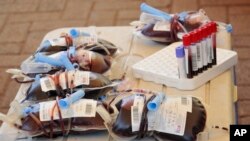Local operators of motorcycle taxis, popularly known as boda bodas, are among the residents leading the blood donation program.
The initiative is a response to calls by authorities who say shortages persist in the East African nation, with a severe impacts on victims of car accidents, pregnant women and ill children.
Lawrence Karaba, a local boda boda operator who donated blood, says he is happy he was previously able to save a child’s life.
“The first time I donated blood, there was a child brought to the hospital from the village … our blood matched so I donated to save him,” Karaba said.
Bosco Gama, another boda boda operator, echoed Karaba’s sentiments.
“That is why we boda boda guys are sacrificing to donate blood,” he said. "It is important to donate blood because you will get to know the status of your health.”
Joyce Awate, a sick resident of Yei, says she is grateful for the program.
“The issues of blood here (in South Sudan) are a big program. There are several people who need blood, and if you don’t receive any, you will not survive,” she said.
Authorities are “looking for people, including the boda boda guys to get blood. If they don’t save people like me with blood, we would all be dead by now,” Awate said.
James Yotama, who runs the blood bank in Yei’s civil hospital, says the healthcare facility is overwhelmed because it is catering to residents from Lainya, Morobo, Lasu and Tore.
“People are really suffering greatly in the hospital because this is not just a county hospital,” he said.
Experts say the national blood shortages can be partly attributed to unsubstantiated beliefs among some South Sudanese that donating blood is dangerous and can cause illness or death.

Forum